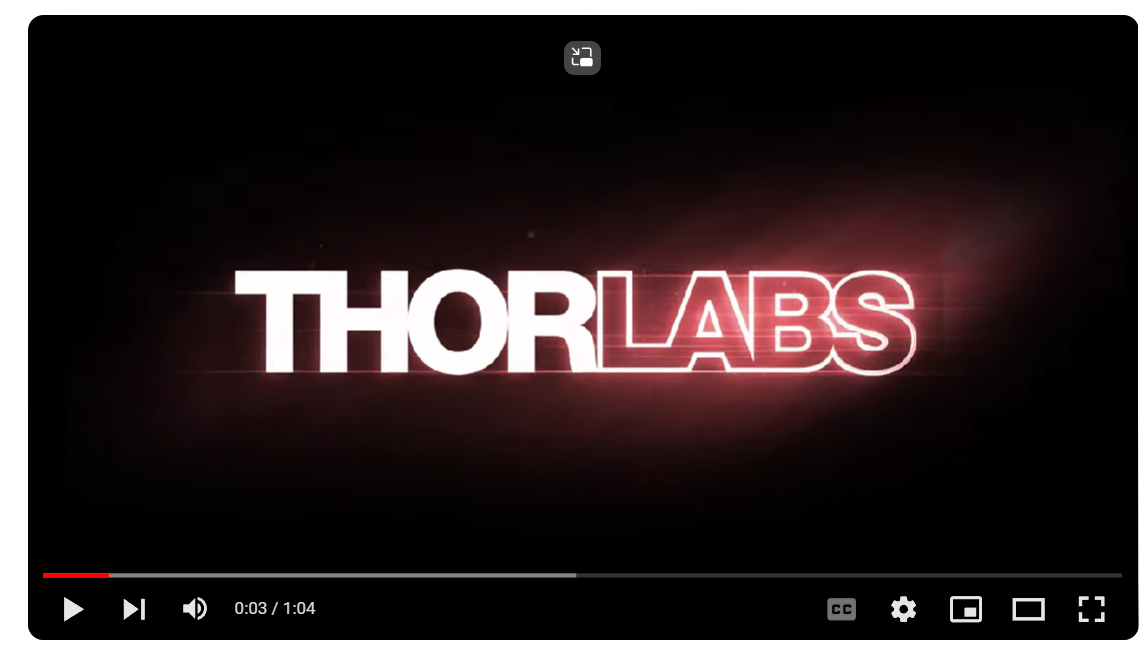
| Chairmen | Venue | Scientific Committee | Local Committee | Dates | Fees | Local support for students |
| Registration procedure | Schedule | Program | Invited speakers | Contact | History of QNS workshops | About the city |
The III International Workshop on Quantum Non-Stationary Systems will be held in Brasilia - Brazil, from August 26th to 30th, 2024. This third meeting will focus on a variety of research fields, specially on quantum fields under time-dependent boundary conditions, dynamics of quantum many-body systems, quantum thermodynamics and other quantum phenomena under external modulations. The main goal is to bring together experimentalists and theoreticians in order to foster discussions and collaborations. To achieve this, there will be only a small number of invited and contributed talks, thus leaving enough time for discussions and poster presentations.
We hope to provide an inspiring environment not just for the speakers, but mainly for the students that will certainly greatly benefit from the expected high scientific level of the event.
Official Photo of the event
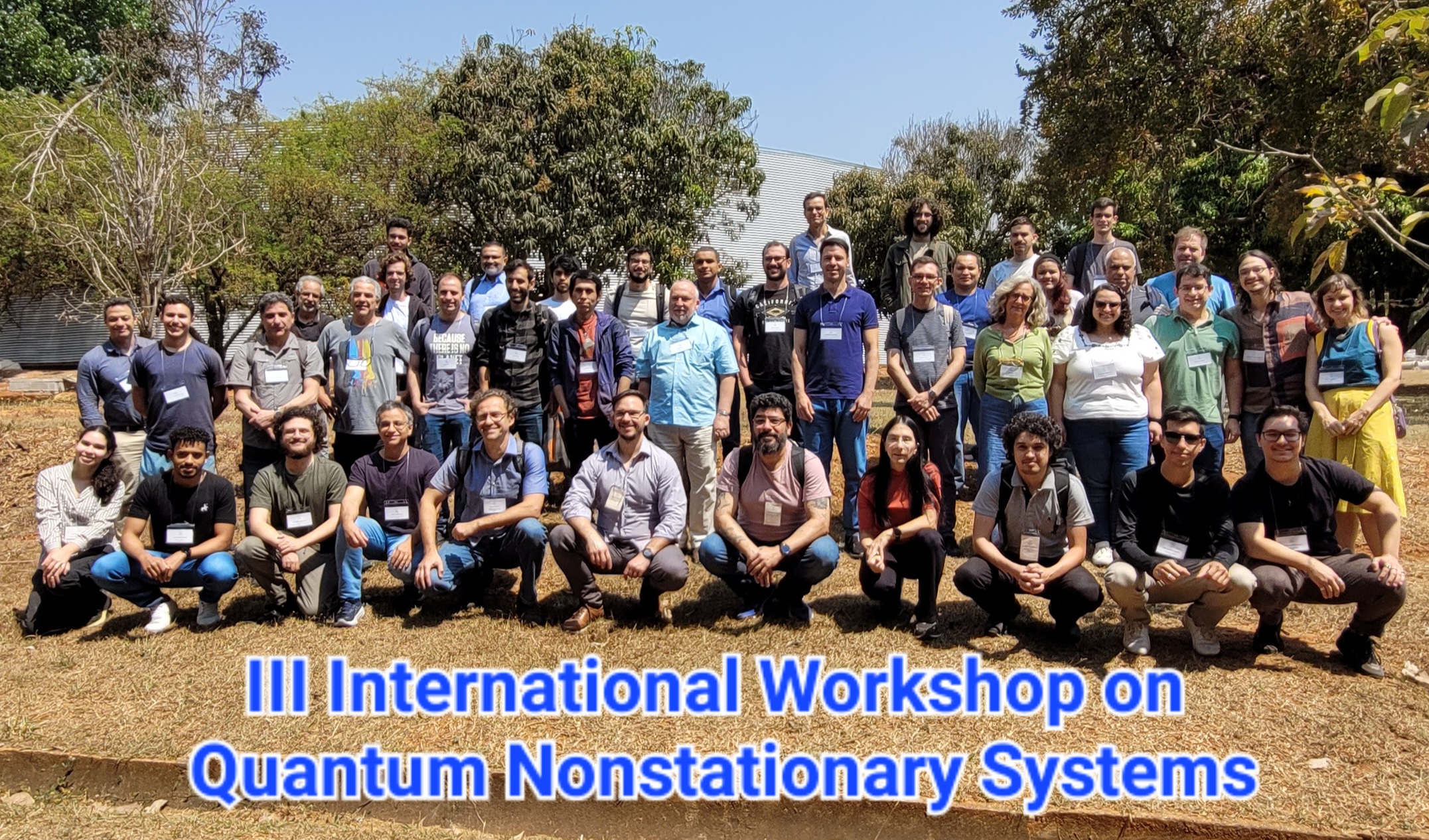
Chairmen
- Lucas Chibebe Céleri
Institute of Physics, Federal University of Goias
Goiania - GO - Brazil
Curriculum Google Scholar ORCID
- Alexandre Dodonov
International Center of Physics, University of Brasilia
Brasilia - DF - Brazil
Curriculum Google Scholar ORCID
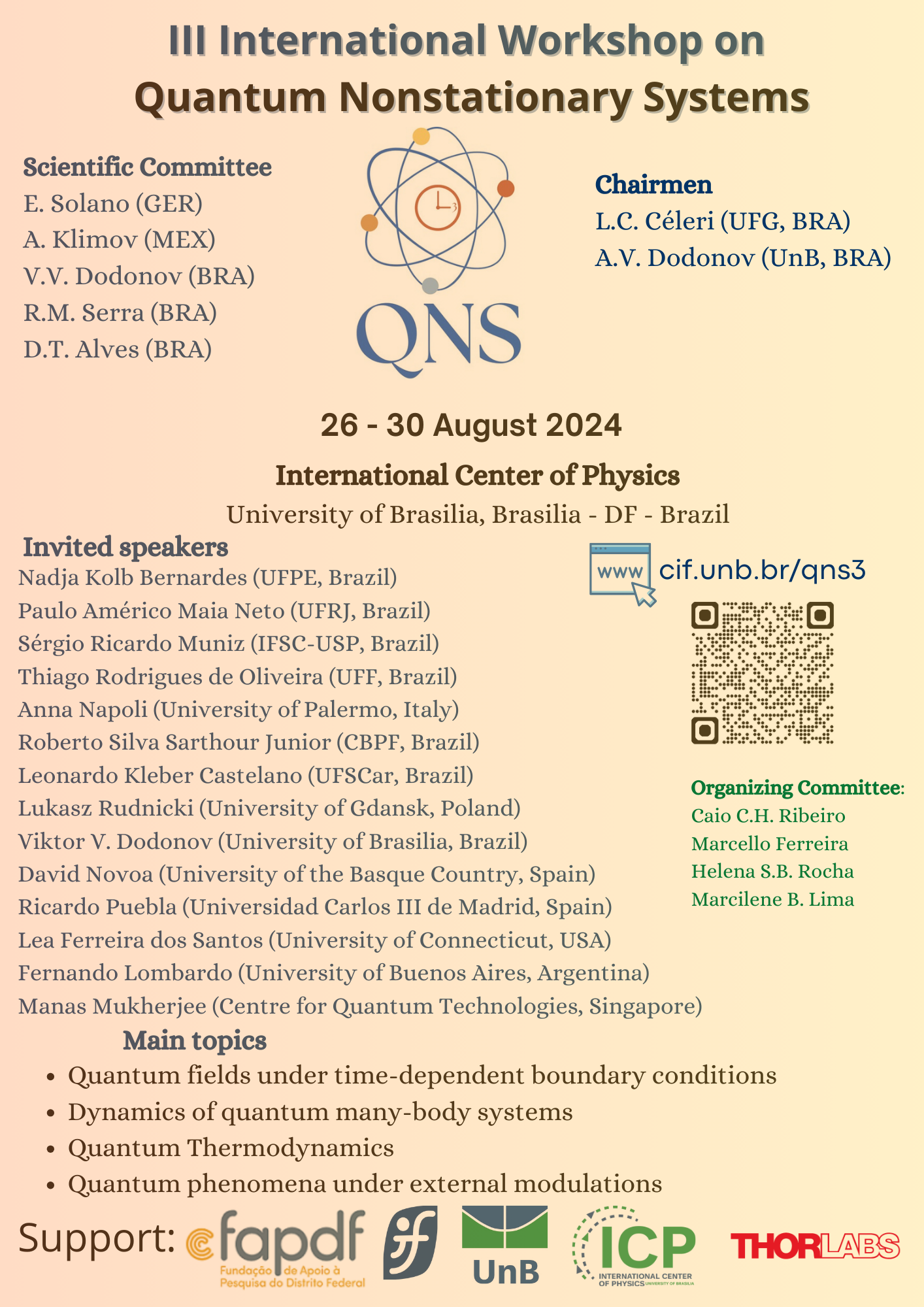
Venue
International Center of Physics - University of Brasilia
The International Center of Physics (ICP) is part of the Institute of Physics of University of Brasilia, dedicated to conducting research, organizing events and promoting the academic mobility in all areas of Physics. Its physical facilities include:
- Auditorium for 144 attendees, fully equipped for online transmissions
- Offices for visiting researchers
- Classroms
- Lounge for coffee breaks and informal discussions
- Cluster for computer simulations


ICP is located at the main campus of University of Brasilia, just 5 km from the National Congress and the main hotels, and 16 km from the International Airport of Brasilia.


The invited speakers will stay at the hotel Nobile Suítes Monumental, in front of the TV Tower and just 400 meters from Brasilia Shopping and Shopping ID, with plenty of bars and restaurants in the vicinity: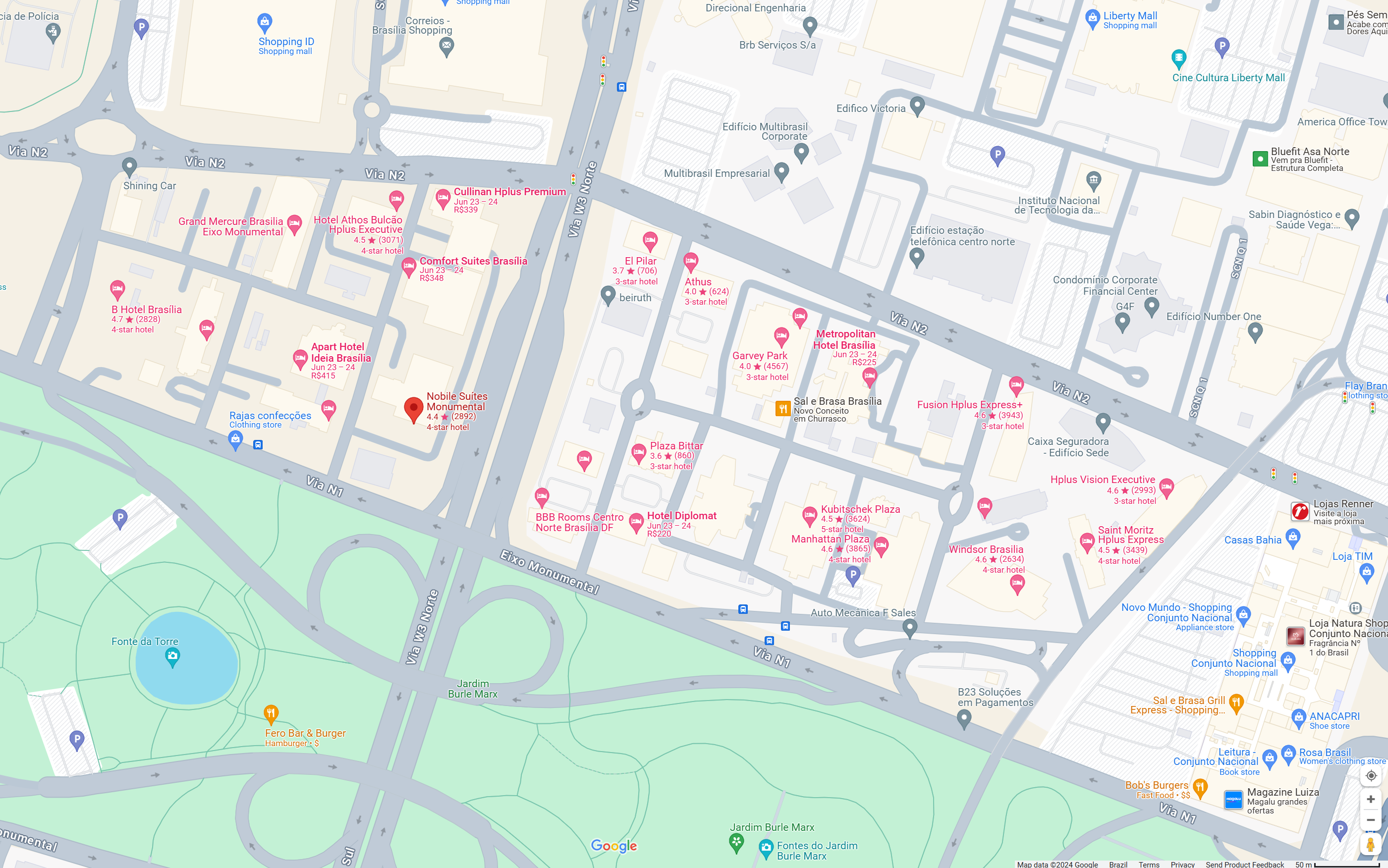
Scientific Committee
- Viktor Dodonov
International Center of Physics, University of Brasilia
Brasilia - DF - Brazil
Curriculum Google Scholar ORCID
- Enrique Solano
Kipu Quantum
Berlin - Germany
Curriculum Google Scholar ORCID
- Andrei Klimov
Department of Physics, University of Guadalajara
Guadalajara - México
Curriculum Google Scholar ORCID
- Roberto Menezes Serra
Center of Natural and Human Sciences, Federal University of ABC
Santo Andre - SP - Brazil
Curriculum Google Scholar ORCID
- Danilo Teixeira Alves
Faculty of Physics, Federal University of Para
Santo Andre - SP - Brazil
Curriculum Google Scholar ORCID
Local Organizing Committee
- Marcello Ferreira
International Center of Physics, University of Brasilia
Brasilia - DF - Brazil
Curriculum Google Scholar ORCID
- Caio Cesar Holanda Ribeiro
International Center of Physics, University of Brasilia
Brasilia - DF - Brazil
Curriculum Google Scholar ORCID
- Helena de Souza Bragança Rocha
International Center of Physics, University of Brasilia
Brasilia - DF - Brazil
Curriculum Google Scholar ORCID - Marcilene B. Lima
Dates and deadlines
- Registration begins: May 15, 2024
- Registration ends: July 15 July 18, 2024
- Deadline for submission of posters and contributed talks: July 15 July 18, 2024
- Decision on acceptance of posters and contributed talks: July 21, 2024
- Deadline for the payment of registration fee (for participants from Brazil): July 15 July 18, 2024
- Deadline for the payment of registration fee (for participants from abroad): upon arrival
Registration fees
The fee covers the coffee breaks and the Welcome cocktail
- Undergraduate students: R$ 100,00
- Graduate students: R$ 150,00
- Postdocs: R$ 200,00
- Professors: R$ 250,00
The current exchange rates are approximately:
- 1 USD = R$ 5.45
- 1 EUR = R$ 5.93
For participants from Brazil, the payment can be made via this PIX. Participants from abroad will be able to pay the registration fee in cash upon the arrival.
Local support for students and postdocs
- There is a limited amount of rooms at the Transit Apartments of University of Brasilia, where the students and postdocs could stay free of charge for up to 6 days.
- Interested students and postdocs can also be eligible for reduced price at the University's restaurant.
For more information, please contact the Chairmen as soon as possible at workshop.qns3@gmail.com
Registration procedure
- Each participant can submit a contributed talk and/or one or two posters.
- The decision about the acceptance of the submitted works will be made by the organizing committee, and will be communicated within two weeks of the submission.
- Registration and submission of oral/poster contributions can be done using this simplified form.
Alternatively, the registration can be done at the website: is.gd/3rdQNS
Tentative schedule
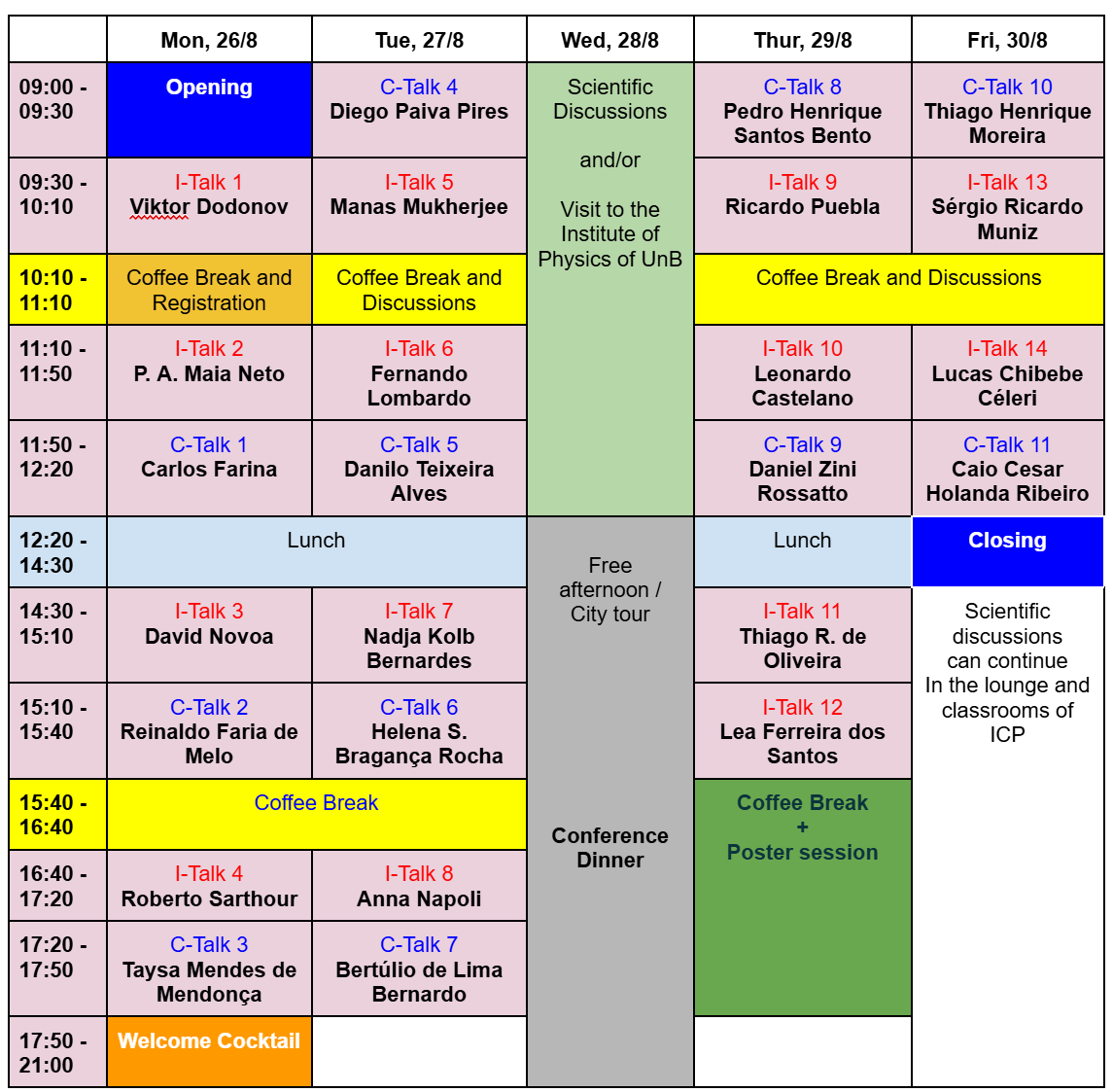
* I-Talk = invited talk (35’+5’)
* C-Talk = Contributed talk (25’+5’)
The Conference dinner will be held at Churrascaria Nativas Grill Brasília Esplanada. Location: Google Maps
Talks
-
Nadja Bernardes
Harmonic oscillator kicked by spin measurements: a Floquet-like system without classical analogous -
Leonardo Castelano
Innovative Techniques for Efficient Hamiltonian Characterization: Integrating Neural Networks with the Freezing Mechanism -
Lea Ferreira Santos
Dynamical manifestations of many-body quantum chaos and the benefits of opening the system -
Paulo Américo Maia Neto
Dynamical Casimir effects with moving ground-state atoms: emission of photons, nonlocal and quantum Sagnac interferometric phases
PDF of the presentation - David Novoa
Coloring light quanta with synchronous molecular motion
PDF of the presentation -
Fernando Lombardo
Superconducting Circuits: From Photon Generation to Universal Quantum Gates
PDF of the presentation -
Anna Napoli
STIRAP processes in presence of spin baths - Caio Cesar Holanda Ribeiro
Quantum backreaction in BECs: Energy and momentum conservation - Viktor Dodonov
How to simulate the Dynamical Casimir Effect in a laboratory - Manas Mukherjee
Single trapped atom: sensing, simulation and beyond - Danilo Teixeira Alves
Vacuum energy around particles - Daniel Zini Rossatto
Dark and bright states of light in cross-cavity systems
PDF of the full presentation - Carlos Farina
On the control of the Purcell effect - Reinaldo Faria de Melo e Souza
Multipole approach to the dynamical Casimir effect - Helena de Souza Bragança Rocha
Quantum quenches: non-equilibrium dynamics of closed many-body systems - Sérgio Ricardo Muniz
Widefield imaging of solid-state qubits in Diamond & 2D Spin Coherence Mapping - Taysa Mendes de Mendonça
System-environment quantum information flow
PDF of the presentation - Thiago Henrique Moreira
Decoherence of a composite particle induced by a weak quantized gravitational field - Bertúlio de Lima Bernardo
Shortcuts to adiabaticity designed via time-rescaling: a new perspective - Diego Paiva Pires
Quantum speed limits and information geometry
PDF of the presentation - Thiago Rodrigues de Oliveira
Canonial Typicality under General Quantum Channels - Lucas Chibebe Céleri
Observer-dependent nature of entropy - Pedro Henrique Santos Bento
Krylov complexity and dynamical phase transition in the quenched Lipkin-Meshkov-Glick model - Ricardo Puebla
Nonequilibrium dynamics in critical long-range interacting systems
PDF of the presentation - Roberto Silva Sarthour Junior
Maxwell Demons in NMR Quantum Computers
PDF of the presentation
The program
The III International Workshop on Quantum Non-Stationary Systems will be held in Brasilia, Brazil's capital, from August 26th to August 30th, 2024.
The main goal of the event is to bring together both experimental and theoretical physicists specializing in quantum non-stationary systems, particularly focusing on many-body dynamics, quantum thermodynamics, and systems influenced by time-dependent boundary conditions. With this objective in mind, we aim to provide an environment that encourages collaboration among participants, with a particular emphasis on bridging the gap between theoreticians and experimentalists.
Main topics of the workshop:
- Quantum fields under time-dependent boundary conditions
- Dynamics of quantum many-body systems
- Quantum thermodynamics
- Other quantum phenomena under external modulations
The official language of the workshop will be English.
The Proceedings of the Workshop
The Proceedings of the event, with articles submitted by the participants of the Workshop and accepted by the Editors, will be published in the form of a book with ISBN (print and online formats). We plan to maintain the format of the book from the previous edition, which can be viewed at this page.
Confirmed Invited talks
01 Anna Napoli (U. Palermo)
02 David Novoa (U. Pais Basco)
03 Fernando Lombardo (U. Buenos Aires)
04 Lea Ferreira dos Santos (U. Conn.)
05 Leonardo Castelano (UFSCar)
06 Viktor Dodonov (UnB)
07 Manas Mukherjee (Centre for Quantum Technologies - Singapore)
08 Nadja Kolb Bernardes (UFPE)
09 Paulo Américo Maia Neto (UFRJ)
10 Ricardo Puebla (U. Carlos III de Madrid)
11 Roberto Silva Sarthour Junior (CBPF)
12 Sérgio Ricardo Muniz (USP)
13 Thiago Rodrigues de Oliveira (UFF)
Confirmed contributed talks
01 Bertúlio de Lima Bernardo (UFPB)
02 Carlos Farina (UFRJ)
03 Daniel Zini Rossatto (UNESP)
04 Danilo Teixeira Alves (UFPA)
05 Diego Paiva Pires (UFMA)
06 Helena de Souza Bragança Rocha (UnB)
07 Pedro Henrique Santos Bento (UFG)
08 Reinaldo Faria de Melo e Souza (UFF)
09 Taysa Mendes de Mendonça (USP)
10 Thiago Henrique Moreira (UFG)
11. Caio Cesar Holanda Ribeiro (UnB)
Confirmed posters
01 Aryadine Fernandes de Sousa (UFABC)
02 Andesson Brito Nascimento (UFG)
03 Gabriel Fernandez Ferrari Melo (UFG)
04 Gaspar Gonzalez (Universidad Nacional de La Plata)
05 João Octávio Oliveira Cony (UFRJ)
06 John Milton Zapana Choquehuanca (UFF)
07 Lucas Queiroz Galvão (Latin American Quantum Computing Center, SENAI CIMATEC)
08 Lucas Ribeiro da Silva Santos (UFSCar)
09 Marcos Vinícius Silva de Paula (UnB)
10 Miguel Citeli (UnB)
11 Vitória Alves de Souza (UnB)
12 Ygor de Oliveira Souza (UNIFEI)
* The size of the poster is limited to 110cm x 130cm.
Contact and Support Information
- adodonov@unb.br
- lucas@qpequi.com
Support
This event has institutional support by Fundação de Apoio à Pesquisa do Distrito Federal (FAPDF).
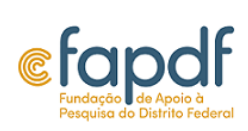
The welcome cocktail will be offered by Thorlabs - Brazil.
History of the QNS Workshops
First edition
On October 19-23 of 2009 the International Center for Condensed Matter Physics (ICCMP) of University of Brasilia, in Brasilia - Brazil, hosted the first edition of the International Workshop on Quantum Nonstationary Systems. The meeting was organized by Viktor V. Dodonov (University of Brasilia, Brasilia, Brazil), Vladimir I. Man'ko (Lebedev Physics Institute, Moscow, Russia) and Salomon S. Mizrahi (Federal University of São Carlos, São Carlos, Brazil), and gathered 80 attendees from 16 different countries. The 5-days workshop consisted of poster presentations, city tour, banquet and 34 invited talks. Figures below show the poster and the official photo of the event:
Official photo of QNS1.
Poster of the 1st edition.
The proceedings of the event with 17 research articles were published in the Special Section CAMOP (Comments on Atomic, Molecular and Optical Physics) of Physica Scripta: V. V. Dodonov and M. A Man'ko, CAMOP: Quantum Non-Stationary Systems, Phys. Scr. 82, 031001 (2010). DOI: 10.1088/0031-8949/82/3/031001
Second edition
Link to the official site of the Second Edition
13 years after the first edition, in 2022, the professors from the Institute of Physics of University of Brasilia, Alexandre Dodonov, Caio Cesar Holanda Ribeiro, Olavo Leopoldino da Silva Filho and Viktor V. Dodonov started to conceive an idea that it would be nice to organize the second edition of the workshop to discuss novel exciting topics that appeared in the field of Nonstationary Quantum Phenomena over the past decade. Besides, this would be an excellent opportunity to celebrate the 75th birthday of Viktor V. Dodonov and his retirement from University of Brasilia, permitting a reunion with long time colleagues, former students and collaborators, as well as getting to know new researchers and students in such a rapidly evolving field. The event would occur at the recently established International Center of Physics (ICP) of University of Brasilia -- the restructuring of the former ICCMP made in 2022 with the goal of contemplating all areas of Physics and to promote collaborations with other research institutions, to assist with academic mobility of students and researchers and to disseminate the scientific knowledge by hosting seminars, colloquia, conferences and other scientific events.
The Second International Workshop on Quantum Nonstationary Systems took place in the Auditorium of ICP from August 28th to September 1st, 2023. It was organized by Alexandre Dodonov, Viktor Dodonov, Caio Cesar Holanda Ribeiro and Olavo Leopoldino da Silva Filho, while Bernardo de Assunção Mello coordinated the online transmission of the presentations. The event, which had institutional support by Fundação de Apoio à Pesquisa do Distrito Federal (FAPDF) and by the Institute of Physics of University of Brasilia, occurred in the hybrid format, with 21 invited speakers attending in-person and 18 remotely. The workshop gathered more than 60 participants from 16 different countries and consisted of poster presentations, city tour, invited talks and banquet; it is worth noting that 17 attendees were also present in the first edition. The Book of Proceedings of the second edition will be published by Livraria da Física, and it is currently in press. Moreover, all the presentation are stored at the ICP’s channel on YouTube: www.youtube.com/@cifunb
The photos below show the official photo, poster and the book of proceedings of the second edition.
Official photo of QNS2.
Poster of the second edition.
The Proceedings of the second edition were published as a book by the brazilian Publisher LF Editorial. The book can be downloaded for free at the website: https://lfeditorial.com.br/produto/proceedings-of-the-second-international-workshop-on-quantum-nonstationary-systems/
About Brasilia - Brazil
Brasilia was inaugurated by President Juscelino Kubitschek. The new capital was a bold plan and acquired the status of symbol of 20th century urbanism and modern architecture.
Brasília is the 3rd capital of Brazil. The first was Salvador, Bahia, and then the city of Rio de Janeiro. The idea behind building a new capital was to populate the center of the country, as well as keep the capital safe from possible maritime attacks.
Brasília, with more than 2.5 million inhabitants, had its basic project, called Plano Piloto, conceived by urban planner Lúcio Costa and architect Oscar Niemeyer. The design resembles an airplane and was listed by UNESCO as a Cultural Heritage of Humanity. It is the city with the largest heritage area in the world - 112.5 square kilometers.
The Pilot Plan is formed by the meeting of two axes, Monumental Axis and Road Axis, embraced by Lake Paranoá. The Monumental Axis has many attractions: the Praça dos Três Poderes, the Palácio do Planalto, the National Congress, the Metropolitan Cathedral of Brasilia and the TV Tower (Torre de Televisão).
Along the Road Axis are the residential blocks, divided between North (North) and South (South). In Brasilia, all construction must comply with pre-determined characteristics in Lucio Costa's project. Residential buildings, for example, are supported only by columns and have their pilotis open to extensive green areas. Parque da Cidade Dona Sarah Kubitschek, better known as Parque da Cidade, is one of the main outdoor leisure centers in the capital. It has 420 hectares and is one of the largest urban parks in the world. It also has sports courts, amusement parks, an artificial lake, barbecue pits, an equestrian center and jogging tracks. Lake Paranoá, which has a shoreline with excellent restaurants and bars, brings together water sports athletes on weekends to practice sports such as Stand Up Paddle (SUP), canoeing and kitesurfing.
Square of the Three Powers (Praça dos Três Poderes)
Praça dos Três Poderes houses the headquarters of the three branches of government: the Planalto Palace (executive branch), the National Congress (legislative branch) and the Federal Supreme Court (judiciary branch). The Square and the buildings that surround it are works by Oscar Niemeyer and Lúcio Costa.
Metropolitan Cathedral of Brasilia
The Metropolitan Cathedral - Nossa Senhora Aparecida or simply Catedral de Brasília, is a Brazilian Catholic temple, in which the chair of the Archdiocese of Brasília is located, located in the federal capital, south of the S1, in the Monumental Axis, region of the Esplanada dos Ministérios. Its architecture was designed by Oscar Niemeyer and is sometimes considered his masterpiece, thanks to which the architect won the Pritzker Prize, considered equivalent to the Nobel Prize for his profession, in 1988.
Alvorada Palace
The Alvorada Palace is a building located in Brasilia, capital of Brazil. The palace is designated as the official residence of the President of Brazil. It is located on the shores of Lake Paranoá, having been the first building inaugurated in the Federal Capital, on June 30, 1958.
TV Tower (Torre de Televisão)
The TV Tower is a visual landmark of the city. It is the second tallest structure in Brazil, at 230 meters high, it can be seen from afar. In addition to being seen from afar, the TV Tower impresses with its grandeur and catches the eye when seen up close. It is no wonder that the point is one of the most visited attractions in the capital. The project is by Lucio Costa, architect and urban planner responsible for the Plano Piloto project for the new capital. It was inaugurated in 1967 to receive radio and TV antennas.
Dona Sarah Kubitschek City Park
Parque da Cidade Dona Sarah Kubitscheck, which is located in Brasília (DF), is considered the second largest urban park in the world with its 4,200,000 m² of area in total (the first is the Phoenix Park in Dublin, Ireland with 7,000 .000 m²). The venue brings together the work of the capital's iconic quartet, its design by Oscar Niemeyer, landscaping work by Burle Marx and the urban area developed by Lúcio Costa, as well as a collection of tiles by Athos Bulcão.
Pontão do Lago Sul
Pontão do Lago Sul, one of Brasília's postcards, was inaugurated in March 2002. It has several bars, restaurants, ample parking and piers. It often hosts fairs, exhibitions and shows.
Historical and Geographical Institute of the Federal District
The Instituto Histórico e Geográfico do DF is a museum that, since it was created, has collected historical material related to the Midwest region, always emphasizing those referring to the history of Brasília and Brazil, as well as those dealing with our geography, genealogy and anthropology. Here there is the Museum of Image and Sound, a permanent exhibition of the work and life of JK, a library, the chair where President Juscelino sat during the 1st mass in 1957 and the Maracangalha jeep that served Bernardo Sayão and JK.
JK Memorial
The JK Memorial was designed by Oscar Niemeyer and is located in the Monumental Axis. It was conceived as a museum and opened in September 1981, two years after the death of former President Juscelino Kubitschek. At the site, JK's body and various belongings are found. The chosen location was symbolic, in the Cruzeiro region, where the first outdoor mass took place in the future Capital, on May 3, 1957, marking the beginning of the construction of the city.


